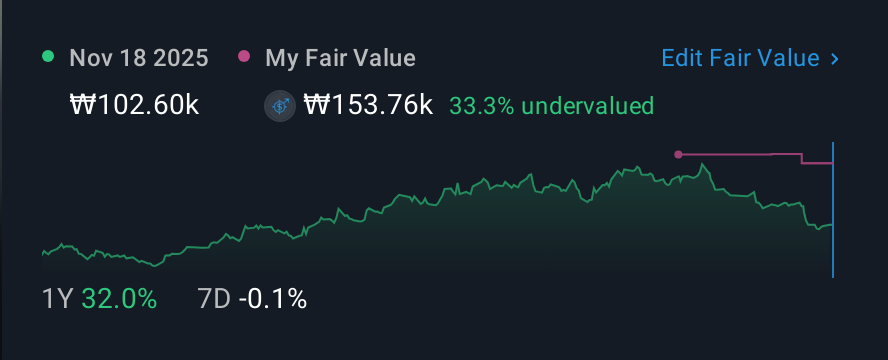- South Korea
- /
- Entertainment
- /
- KOSDAQ:A041510
SM Entertainment Co., Ltd.'s (KOSDAQ:041510) biggest owners are public companies who got richer after stock soared 5.2% last week

Key Insights
- Significant control over SM Entertainment by public companies implies that the general public has more power to influence management and governance-related decisions
- The top 2 shareholders own 51% of the company
- Institutional ownership in SM Entertainment is 11%
If you want to know who really controls SM Entertainment Co., Ltd. (KOSDAQ:041510), then you'll have to look at the makeup of its share registry. The group holding the most number of shares in the company, around 51% to be precise, is public companies. That is, the group stands to benefit the most if the stock rises (or lose the most if there is a downturn).
As a result, public companies collectively scored the highest last week as the company hit ₩3.5t market cap following a 5.2% gain in the stock.
Let's take a closer look to see what the different types of shareholders can tell us about SM Entertainment.
View our latest analysis for SM Entertainment

What Does The Institutional Ownership Tell Us About SM Entertainment?
Many institutions measure their performance against an index that approximates the local market. So they usually pay more attention to companies that are included in major indices.
SM Entertainment already has institutions on the share registry. Indeed, they own a respectable stake in the company. This suggests some credibility amongst professional investors. But we can't rely on that fact alone since institutions make bad investments sometimes, just like everyone does. If multiple institutions change their view on a stock at the same time, you could see the share price drop fast. It's therefore worth looking at SM Entertainment's earnings history below. Of course, the future is what really matters.

Hedge funds don't have many shares in SM Entertainment. The company's largest shareholder is Kakao Corp., with ownership of 41%. Meanwhile, the second and third largest shareholders, hold 9.7% and 2.8%, of the shares outstanding, respectively.
To make our study more interesting, we found that the top 2 shareholders have a majority ownership in the company, meaning that they are powerful enough to influence the decisions of the company.
While it makes sense to study institutional ownership data for a company, it also makes sense to study analyst sentiments to know which way the wind is blowing. Quite a few analysts cover the stock, so you could look into forecast growth quite easily.
Insider Ownership Of SM Entertainment
The definition of an insider can differ slightly between different countries, but members of the board of directors always count. The company management answer to the board and the latter should represent the interests of shareholders. Notably, sometimes top-level managers are on the board themselves.
I generally consider insider ownership to be a good thing. However, on some occasions it makes it more difficult for other shareholders to hold the board accountable for decisions.
Our information suggests that SM Entertainment Co., Ltd. insiders own under 1% of the company. Keep in mind that it's a big company, and the insiders own ₩16b worth of shares. The absolute value might be more important than the proportional share. It is always good to see at least some insider ownership, but it might be worth checking if those insiders have been selling.
General Public Ownership
The general public-- including retail investors -- own 37% stake in the company, and hence can't easily be ignored. This size of ownership, while considerable, may not be enough to change company policy if the decision is not in sync with other large shareholders.
Public Company Ownership
We can see that public companies hold 51% of the SM Entertainment shares on issue. It's hard to say for sure but this suggests they have entwined business interests. This might be a strategic stake, so it's worth watching this space for changes in ownership.
Next Steps:
It's always worth thinking about the different groups who own shares in a company. But to understand SM Entertainment better, we need to consider many other factors. For instance, we've identified 2 warning signs for SM Entertainment that you should be aware of.
Ultimately the future is most important. You can access this free report on analyst forecasts for the company.
NB: Figures in this article are calculated using data from the last twelve months, which refer to the 12-month period ending on the last date of the month the financial statement is dated. This may not be consistent with full year annual report figures.
New: Manage All Your Stock Portfolios in One Place
We've created the ultimate portfolio companion for stock investors, and it's free.
• Connect an unlimited number of Portfolios and see your total in one currency
• Be alerted to new Warning Signs or Risks via email or mobile
• Track the Fair Value of your stocks
Have feedback on this article? Concerned about the content? Get in touch with us directly. Alternatively, email editorial-team (at) simplywallst.com.
This article by Simply Wall St is general in nature. We provide commentary based on historical data and analyst forecasts only using an unbiased methodology and our articles are not intended to be financial advice. It does not constitute a recommendation to buy or sell any stock, and does not take account of your objectives, or your financial situation. We aim to bring you long-term focused analysis driven by fundamental data. Note that our analysis may not factor in the latest price-sensitive company announcements or qualitative material. Simply Wall St has no position in any stocks mentioned.
About KOSDAQ:A041510
SM Entertainment
Engages in music/sound production, talent management, and music/audio content publication activities in South Korea and internationally.
Flawless balance sheet with solid track record.
Similar Companies
Market Insights
Community Narratives




